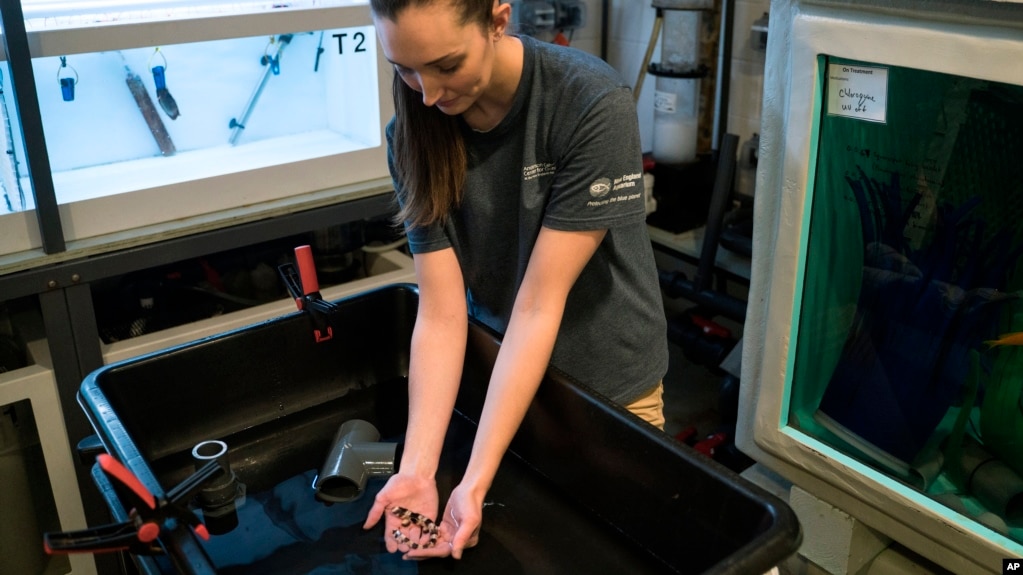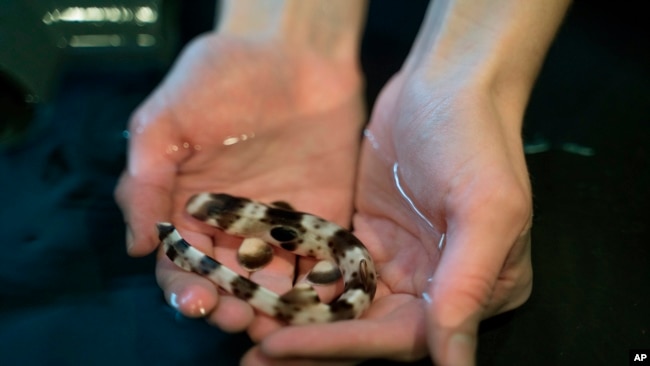
In this February 2019 photo provided by the New England Aquarium, scientist Carolyn Wheeler holds a baby epaulette shark in Quincy, Mass. Scientists have found the baby sharks are less likely to survive to maturity in warming ocean waters.
Scientists say baby sharks are at risk of being born smaller and without the energy they need to survive because of warming oceans from climate change.
Scientists working with the New England Aquarium in Boston, Massachusetts studied epaulette sharks, which live off Australia and New Guinea. They found that warmer conditions sped up the sharks’ growing process. That meant the sharks were born earlier and very tired.
John Mandelman is vice president and chief scientist of the Anderson Cabot Center for Ocean Life at the New England Aquarium. He said the findings could be used in the study of other sharks, including those that give birth to live young. The scientists published their findings in the journal Scientific Reports earlier this year.
Mandelman said it is widely believed that epaulette sharks are “hardy,” or able to survive difficult conditions. “What it means is this very resilient species is more vulnerable than we thought, and this could be true of other sharks,” he added.
The scientists studied 27 sharks using the New England Aquarium’s reproduction program. Some were raised in average summer water temperatures, about 27 degrees Celsius. Others were raised in higher temperatures around 29 degrees Celsius and 31 degrees Celsius.
They found that the sharks raised in the warmest temperatures weighed much less than those raised in average temperatures. They also showed reduced energy levels.

In this February 2019 photo provided by the New England Aquarium, scientist Carolyn Wheeler holds a baby epaulette shark in Quincy, Mass. Scientists have found the baby sharks are less likely to survive to maturity in warming ocean waters. (New England Aquarium/Emily Moothart via AP)
Epaulette sharks can grow to a length of about one meter. Their name comes from large spots on their bodies that look like decorations on some military clothing. The sharks are listed as stable and a species of “least concern” on the International Union for Conservation of Nature Red List of Threatened Species.
One study this year found that worldwide numbers of oceanic sharks and rays dropped more than 70 percent between 1970 and 2018. Overfishing is a main concern, while climate change and pollution also threaten sharks.
Carolyn Wheeler is a doctoral student at the University of Massachusetts Boston and with the ARC Centre of Excellence for Coral Reef Studies at James Cook University in Australia. She was the lead author of the epaulette shark study. She said that while all the sharks survived, those raised in warmer temperatures were not strong enough to survive for long in the wild.
She added that if the sharks are born smaller than usual “they are probably going to have to start looking for food sooner — and they’re going to have less time to adjust to their surroundings.”
Mariah Pfleger is an ocean scientist at the protection group Oceana. She said the study should serve as a warning to ocean governing agencies that careful supervision is needed to prevent the loss of more sharks.
“This study further exemplifies that sharks will not be immune to a warming ocean,” Pfleger added.
I’m Jonathan Evans.
Words in This Story
adjust – v. to change in order to work or do better in a new situation
decorations – n. a medals or awards given to someone for doing something brave or honorable such as fighting bravely in a war
exemplify – v. to be a very good example of something; to show something very clearly
immune – adj. not capable of being affected by a disease
resilient – adj. able to become strong, healthy, or successful again after something bad happens
species – n. a group of animals or plants that are similar and can produce young animals or plants
stable – adj. in a good state or condition that is not easily changed or likely to change
vulnerable – adj. easily hurt or harmed physically, mentally, or emotionally
Comprehension Quiz
What sped up the sharks' growing process?